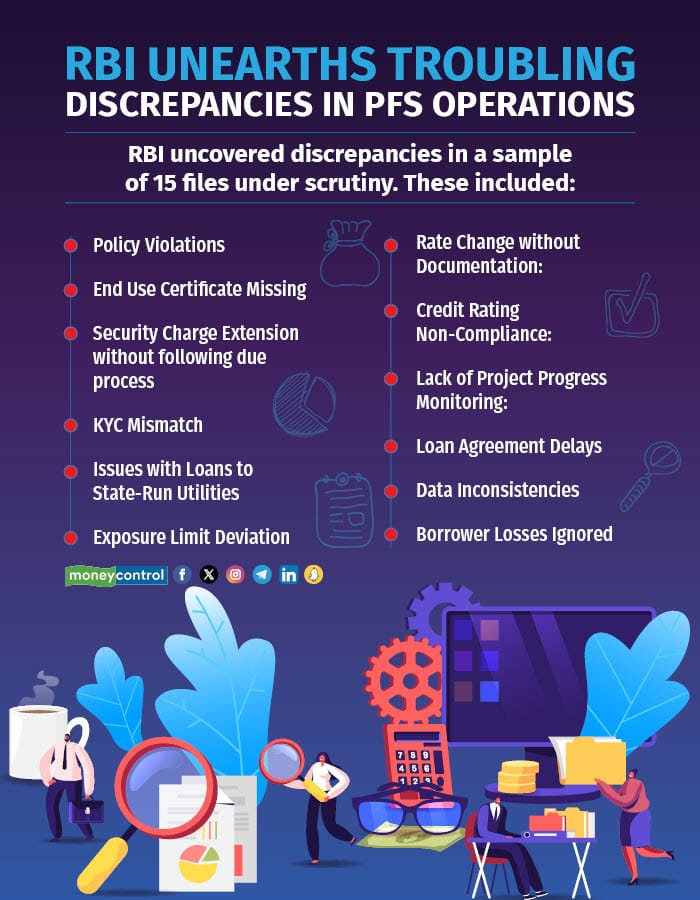



PTC India Financial Services (PFS) deviated from loan sanction norms and accorded “excessive discretionary power” to a former top official, raising concerns over risk management practices and the robustness of its governance framework, the Reserve Bank of India said in a report.
The RBI’s Risk Assessment Report (RAR) and Inspection Report (IR) on PFS as on March 31, 2022, which was sent to the company on August 17, 2023, comes when the company is already under the regulatory scanner for alleged corporate governance lapses. Moneycontrol reviewed the reports.
PFS is yet to discuss the report with its board and get back to the RBI with a board-approved, time-bound plan on how it intends to mitigate risk and address the observations made in the report, as directed by the central bank, sources told Moneycontrol.
PFS, the non-banking financial arm of PTC India partially owned by state run-power companies, has been mired in controversy since January 2022, when three independent directors resigned, citing corporate governance lapses.
The RBI report pointed to deeper operational issues at the company, over and above the corporate governance lapses, which the central bank, the Securities and Exchange Board of India (SEBI) and Ministry of Corporate Affairs (MCA) are probing.

The discrepancies were found in a sample of 15 files that the RBI inspected. They included instances of the company not following due processes in loan sanctions and/or disbursement, non-compliance with credit terms, and mismatch between PAN and Aadhaar in some customer validation documents.
The RBI said there were deviations in matters such as operational policy, benchmark rates, loan tenures, benchmark rate spread and minimum security coverage.
Moneycontrol sent detailed email queries to PFS and the RBI, seeking their comments on the matter. There was no response from either.
The Report
The RBI conducted an offsite assessment and inspection for Supervisory Evaluation (ISE) on PFS, under Section 45N of the RBI Act, 1934, from December 7 to 21, 2022. Based on this, the RAR and IR were sent to the company on August 17.
The central bank directed the company to present the report to its board within 60 days. The report lists key supervisory concerns based on risk assessment. The RBI directed PFS to come up with a time-bound risk mitigation plan.
“The company is expected to discuss in detail and finalise a board-approved plan for mitigation of risk and redressal of observations as detailed in the reports. The plan may also list the specific and auditable milestones and along with the progress report on its implementation it may be furnished to RBI, when called for,” it said in the covering letter to the report.
PFS sources told Moneycontrol that the report was yet to be taken up by the board.
Commenting on the credit risk faced by the company, RBI said, “Deviations to original sanction terms and conditions exhibits the incapability of the company to adhere to its own policies and functions as per norms, the level of credit risk was assessed as ‘medium’ and direction as ‘increasing’.”

The Discrepancies
One case of discrepancy that came to light was the sanctioning of a corporate loan of Rs 250 crore on June 21, 2021, on a revolving basis. The loan, intended for temporary refinancing of existing loans and meeting fund requirements of under-construction projects.
The loan was disbursed in three tranches of Rs 250 crore each. While the borrower was required to furnish a utilisation of funds certificate, this was conspicuously absent in two of the loans scrutinised by RBI.
Additionally, PFS modified the timeline for creating security charges on borrower-offered assets. This was done upon borrower requests, despite a lack of clarity in the company's operational policy regarding the permissible duration for such extensions, the RBI said. Consequently, these loan facilities may have remained unsecured for extended periods.
The RBI also uncovered a mismatch in ‘know your customer’ (KYC) documentation between PAN (Permanent Account Number) and Aadhaar in one of the sampled loan accounts, raising concerns about proper documentation and compliance.
The discrepancies were not confined to operational issues. PFS's lending to state-run utilities came under scrutiny as well. Despite negative annual integrated ratings for state power distribution utilities and inadequate security or collateral, PFS sanctioned loans to them.
PFS's non-adherence to exposure limits for state power utilities also drew the RBI's attention. The prescribed limit should not exceed 25 percent of the net outstanding loan book from all state power utilities. However, there were instances of this limit being breached by as much as 38.9 percent.
One case of concern pertained to a loan sanction letter issued by PFS on March 11, 2021. The interest rate was set at 10.5 percent, but it was lowered to 10.25 percent within four days. The RBI noted that the change was approved by the MD and CEO even though it lacked supporting documentation such as the date of application, agenda notes, and Annual Recurring Revenue analysis.
The RBI's investigation revealed instances where PFS failed to comply with the requirement for the credit rating of borrowers. In one instance, the stipulated condition was not met within the specified six months from disbursement.
Moreover, the RBI noted lack of progress reports on projects from borrowers, indicating that the company was not effectively monitoring their implementation, a significant oversight.
The RBI cited a case of three loans worth Rs 450 crore discussed at a board meeting on September 18, 2022, which had a major deviation from policy. Members of the board agreed to approve it even after the chairman of the audit committee of the board had reservations.
The borrower had incurred losses since 2015-16 and the external credit rating of its long-term borrowings continued to be classified as non-investment grade.
“This substantiates that despite the borrower's incurring losses, the board approved the proposal of sanction of loan,” RBI said.
The RBI found one instance of fraud related to consortium lending aggregating to Rs 264.87 crore. It said the company did not conduct a quarterly review of frauds by the board of directors and audit committee as per the periodicity mentioned in the guidelines. The RBI said PFS was found to be deficient in monitoring frauds.
Concentration of power
The RBI underscored operational risks stemming from frequent changes in PFS's board of directors, key management personnel, and committee composition, notably the nomination and remuneration committee. Throughout the 2021-22 period and up to the conclusion of the audit, there were about 20 changes to the composition of the board.
Another concern raised was the excessive delegation of authority to then MD and CEO Pawan Singh for day-to-day operations. This included the power to unilaterally alter loan terms and conditions and approve disbursements.
“Such independent modifications in critical sanction conditions without the approval of the board or credit committee provides excessive discretionary power to an individual, may accentuate into higher credit and operation risk. Also, it was observed that there was no collective accountability defined in the sanctioning process,” RBI concluded.
Governance lapses
RBI also highlighted governance lapses and oversights at PFS relating to appointment of directors, irregularities in selection process, and other issues that have been highlighted by the resigning independent directors in the past and are being probed by the regulators.
In a separate development preceding the RBI report, on May 8, SEBI issued a show cause notice to PTC India chairman Rajib Mishra (also chairman of PFS) and Pawan Singh for alleged corporate governance lapses at PFS. These included decisions made without board approval and modification of loan terms and conditions. SEBI held Mishra and Singh responsible for corporate governance failure due to their influence within PFS.
On June 27, the Registrar of Companies said it found PFS and Singh in violation of the Companies Act, 2013, and penalised both in three separate adjudication orders.
Singh was sent on leave at the end of June on an RBI directive. Mishra’s appointment as CMD of parent company PTC was approved, backed by state-run shareholders, despite regulatory scrutiny of the process.
These revelations, coupled with instances of delays in signing loan agreements and inconsistencies in data management, collectively paint a troubling picture of PFS's operations. The RBI's findings raise critical questions regarding the organisation's adherence to policies, its risk management practices, and the robustness of its governance framework.
PTC, established in 1999 as a government-initiated public-private partnership, counts state-run NTPC, Power Grid Corporation of India, Power Finance Corporation, NHPC, Life Insurance Corporation, and Damodar Valley Corporation among its stakeholders, with varying ownership percentages.
Discover the latest Business News, Sensex, and Nifty updates. Obtain Personal Finance insights, tax queries, and expert opinions on Moneycontrol or download the Moneycontrol App to stay updated!
Find the best of Al News in one place, specially curated for you every weekend.
Stay on top of the latest tech trends and biggest startup news.